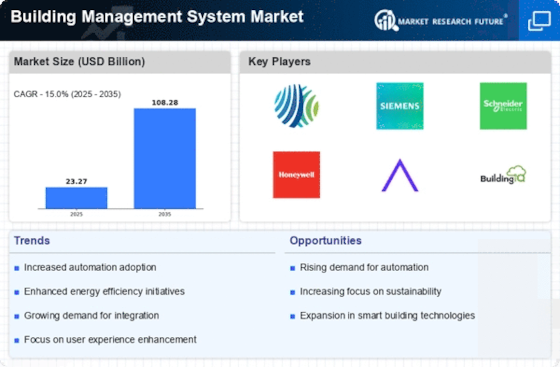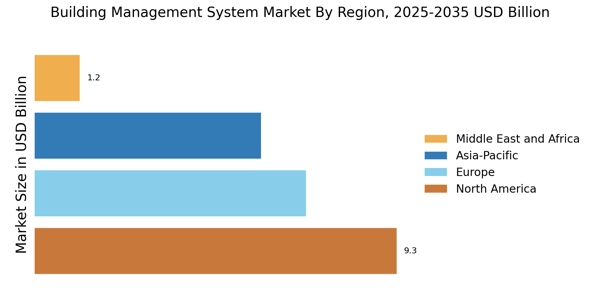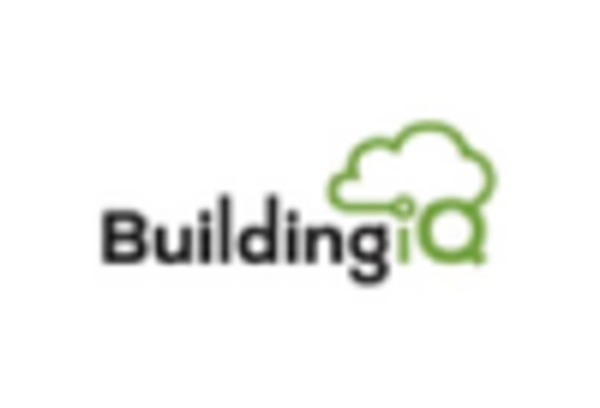Rising Demand for Smart Buildings
The increasing demand for smart buildings is a pivotal driver in the Building Management System Market. As urbanization accelerates, the need for efficient building management solutions becomes paramount. Smart buildings utilize advanced technologies to optimize energy consumption, enhance security, and improve occupant comfort. According to recent data, the smart building market is projected to reach USD 109.48 billion by 2025, indicating a robust growth trajectory. This trend is likely to propel the adoption of building management systems that integrate various functionalities, such as lighting control, HVAC management, and security systems, into a cohesive platform. Consequently, the Building Management System Market is expected to witness significant advancements as stakeholders seek to capitalize on the benefits of smart building technologies.
Increased Focus on Health and Wellbeing
The increased focus on health and wellbeing is emerging as a significant driver in the Building Management System Market. As awareness of indoor air quality and occupant comfort rises, building management systems are being designed to monitor and enhance these factors. Systems that provide real-time data on air quality, temperature, and humidity are becoming essential for creating healthy indoor environments. Research indicates that improved indoor air quality can lead to a 10% increase in productivity among occupants. Consequently, building owners are investing in management systems that prioritize health and wellbeing, thereby driving growth in the Building Management System Market. This trend reflects a broader societal shift towards creating spaces that support the physical and mental health of occupants.
Technological Advancements in Automation
Technological advancements in automation are reshaping the Building Management System Market. The integration of artificial intelligence, machine learning, and data analytics into building management systems enables real-time monitoring and predictive maintenance. These technologies facilitate the optimization of building operations, leading to reduced operational costs and improved energy efficiency. For example, AI-driven systems can analyze historical data to predict equipment failures, allowing for timely interventions. The automation of building management processes is projected to enhance operational efficiency by up to 30%, according to industry estimates. As automation continues to evolve, the Building Management System Market is expected to experience substantial growth, driven by the demand for intelligent and responsive building solutions.
Growing Integration of Renewable Energy Sources
The growing integration of renewable energy sources is a crucial driver in the Building Management System Market. As the shift towards sustainable energy solutions accelerates, building management systems are increasingly incorporating renewable energy technologies such as solar panels and wind turbines. This integration allows buildings to optimize energy usage and reduce reliance on traditional energy sources. Data suggests that buildings equipped with renewable energy systems can achieve energy savings of up to 50%. Furthermore, the rising adoption of energy storage solutions complements this trend, enabling buildings to store excess energy for later use. As a result, the Building Management System Market is poised for growth as stakeholders seek to enhance energy efficiency and sustainability through the integration of renewable energy.
Regulatory Compliance and Sustainability Initiatives
Regulatory compliance and sustainability initiatives are increasingly influencing the Building Management System Market. Governments and regulatory bodies are implementing stringent energy efficiency standards and sustainability guidelines to combat climate change. For instance, the implementation of the Energy Efficiency Directive in various regions mandates that buildings meet specific energy performance criteria. This regulatory landscape compels building owners and managers to invest in advanced building management systems that facilitate compliance and enhance operational efficiency. The market for energy-efficient building technologies is anticipated to grow, with estimates suggesting a compound annual growth rate of 10.5% from 2020 to 2027. As a result, the Building Management System Market is likely to expand as organizations prioritize sustainability and regulatory adherence.
















